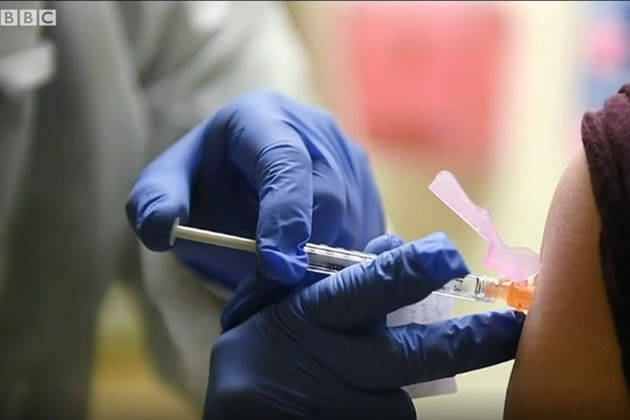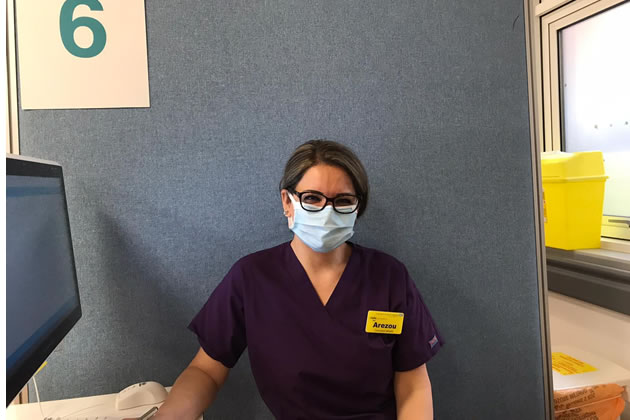Vaccinations Begin at St. George's Hospital
Over 80s attending as out patients and those being discharged will get jab first

St George’s Hospital started coronavirus vaccinations from this Tuesday (December 8).
Hospital and NHS staff across the country have been working over the weekend to prepare the sites and accept deliveries.
First in line for the Pfizer vaccine will be people aged 80 and over, as well as care home workers and high risk NHS workers.
The very first patient was Tharmini Gopalakrishnan, 60, who works in a local care home.
She was given the jab by Arezou Rezvani, who is a member of the hospital’s vaccination team.
Later on, a lady called Afshan, who works in a care home in Wimbledon, was given the jab.
Another lady called Theresa said she felt “privileged” to be one of the first to have the vaccine this Tuesday morning.
She added: “I really don’t think people should be afraid of the vaccine, they should go for it, there’s absolutely nothing to it. It’s been such an exciting day, everything has been so professional and done professionally.”
At 6:31am on the same day, Margaret Keenan, 90, became the first person in the world to be given the Pfizer Covid-19 jab as part of a mass vaccination programme.
Patients aged 80 and above who are already attending hospital as an outpatient, and those who are being discharged home after a hospital stay, will be among the first to receive the potentially life-saving jab.

Arezou Rezvani, a member of the hospital’s vaccination team, gave the first jab
St George’s will begin inviting over 80s in for a vaccination, and work with care home providers to book their staff in to vaccination clinics.
Staff will contact patients when it is the right time to come forward, so people should not contact or visit the hospital to seek a vaccine before then.
GPs and other primary care staff are also being put on standby to start delivering the vaccine.
A small number of GP-led primary care networks will begin doing so during the following week (week beginning 14 December) with more practices in more parts of the country joining in on a phased basis during December and in the coming months.
Vaccination centres treating large numbers of patients in sporting venues and conference centres will subsequently stand up when further supplies of vaccine come on stream.
Jacqueline Totterdell, Chief Executive at St George’s University Hospitals NHS Foundation Trust, said, “We are excited to be supporting the Covid-19 vaccination programme, and I would like to thank St George’s staff, who have worked around the clock to ensure we are ready to run clinics this week.”
As of 3 December 2020, there are 19 Covid-19 positive patients being cared for in intensive care at St George’s.
A further 56 Covid-19 positive patients are being cared for on the wards.
Sadly 329 patients have died and tested positive for Covid-19 at the hospital since March 2020.
Professor Stephen Powis, NHS National Medical Director, has praised hospitals for their hard work to kickstart the first phase of the vaccination programme this week, despite “huge complexities.”
He added: “The NHS has a strong record of delivering large scale vaccination programmes – from the flu jab, HPV vaccine and lifesaving MMR jabs – hardworking staff will once again rise to the challenge to protect the most vulnerable people from this awful disease.”
The vaccine is typically delivered by a simple injection in the shoulder but there is a complex and difficult logistical challenge to deliver from the manufacturers Pfizer to patients. It needs to be stored at -70C before being thawed out and can only be moved four times within that cold chain before being used.
Health Secretary Matt Hancock said: “This coming week will be an historic moment as we begin vaccination against COVID-19.
“We are prioritising the most vulnerable first and over-80s, care home staff and NHS colleagues will all be among the first to receive the vaccines.
“We are doing everything we can to make sure we can overcome significant challenges to vaccinate care home residents as soon as possible too.
“I urge everybody to play their part to suppress this virus and follow the local restrictions to protect the NHS while they carry out this crucial work.”
Sian Bayley - Local Democracy Reporter
December 8, 2020